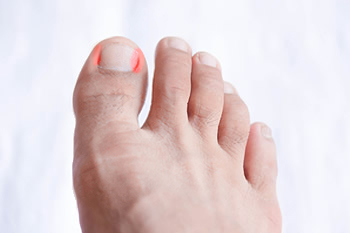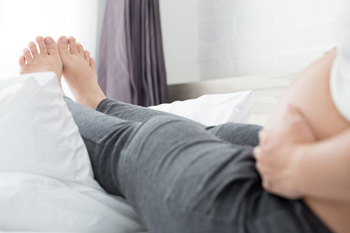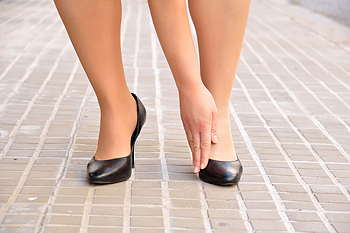 An ingrown toenail occurs when the toenail curves and grows down into the skin on the sides of the nail. As the toenail digs into the flesh and the flesh grows around it, pain, inflammation, redness, swelling or even an infection can follow. Common factors that lead to ingrown toenails include genetics (such as poor posture, gait, or a deformity), improperly cutting the toenails, and wearing tight shoes. Ingrown toenails are not usually serious. However, they can become very painful and infected if left untreated. If you have diabetes or a compromised immune system, your nail is in persistent pain, or your nail is showing signs of being infected, you should consult with a podiatrist for a proper treatment option.
An ingrown toenail occurs when the toenail curves and grows down into the skin on the sides of the nail. As the toenail digs into the flesh and the flesh grows around it, pain, inflammation, redness, swelling or even an infection can follow. Common factors that lead to ingrown toenails include genetics (such as poor posture, gait, or a deformity), improperly cutting the toenails, and wearing tight shoes. Ingrown toenails are not usually serious. However, they can become very painful and infected if left untreated. If you have diabetes or a compromised immune system, your nail is in persistent pain, or your nail is showing signs of being infected, you should consult with a podiatrist for a proper treatment option.
Ingrown toenails may initially present themselves as a minor discomfort, but they may progress into an infection in the skin without proper treatment. For more information about ingrown toenails, contact Genine Befumo, DPM of University Foot and Ankle Center, L.L.C. Our doctor can provide the care you need to keep you pain-free and on your feet.
Ingrown Toenails
Ingrown toenails are caused when the corner or side of a toenail grows into the soft flesh surrounding it. They often result in redness, swelling, pain, and in some cases, infection. This condition typically affects the big toe and may recur if it is not treated properly.
Causes
- Improper toenail trimming
- Genetics
- Improper shoe fitting
- Injury from pedicures or nail picking
- Abnormal gait
- Poor hygiene
You are more likely to develop an ingrown toenail if you are obese, have diabetes, arthritis, or have any fungal infection in your nails. Additionally, people who have foot or toe deformities are at a higher risk of developing an ingrown toenail.
Symptoms
Some symptoms of ingrown toenails are redness, swelling, and pain. In rare cases, there may be a yellowish drainage coming from the nail.
Treatment
Ignoring an ingrown toenail can have serious complications. Infections of the nail border can progress to a deeper soft-tissue infection, which can then turn into a bone infection. You should always speak with your podiatrist if you suspect you have an ingrown toenail, especially if you have diabetes or poor circulation.
If you have any questions, please feel free to contact our office located in Monroe Township, NJ . We offer the newest diagnostic and treatment technologies for all your foot care needs.
A woman’s body can produce much more fluid and blood during pregnancy, which can lead to swelling and pain in the feet, ankles, and other parts of the body. Although this swelling, or edema, will affect most pregnant women, there are a few things they can do which may help alleviate symptoms and keep their feet more comfortable. Pregnant women should keep themselves hydrated throughout the day, and also limit salt intake. Elevating the feet for at least one hour is an easy way to improve blood circulation, while relieving pressure on the veins and reducing swelling. Shoes should be both supportive and wide enough to accommodate feet that have swollen during pregnancy. Soaking the feet for 15 minutes in the tub or a basin filled with warm water and Epsom salt can do wonders to relieve swollen, achy feet, and provide some much-needed self care. A podiatrist can provide additional information on proper footwear, and offer treatments to relieve swelling and keep feet safe and healthy throughout pregnancy.
Pregnant women with swollen feet can be treated with a variety of different methods that are readily available. For more information about other cures for swollen feet during pregnancy, consult with Genine Befumo, DPM from University Foot and Ankle Center, L.L.C. Our doctor will attend to all of your foot and ankle needs.
What Foot Problems Can Arise During Pregnancy?
One problem that can occur is overpronation, which occurs when the arch of the foot flattens and tends to roll inward. This can cause pain and discomfort in your heels while you’re walking or even just standing up, trying to support your baby.
Another problem is edema, or swelling in the extremities. This often affects the feet during pregnancy but tends to occur in the later stages.
How Can I Keep My Feet Healthy During Pregnancy?
- Wearing orthotics can provide extra support for the feet and help distribute weight evenly
- Minimize the amount of time spent walking barefoot
- Wear shoes with good arch support
- Wear shoes that allow for good circulation to the feet
- Elevate feet if you experience swelling
- Massage your feet
- Get regular, light exercise, such as walking, to promote blood circulation to the feet
If you have any questions please feel free to contact our office located in Monroe Township, NJ . We offer the newest diagnostic and treatment technologies for all your foot and ankle needs.
Many common foot and ankle injuries can be caused or influenced by the shoes that you wear. Although high heels are pretty and stylish, they are also potentially damaging to the feet and ankles. Sprained ankles, a condition in which one or more ligaments in the ankle become overstretched or torn, may occur in those who frequently wear high heels taller than two inches. Strained and shortened calf muscles, plantar fasciitis, and back and knee pain may also develop due to high heels. Foot deformities, such as bunions and hammertoes, as well as skin changes like blisters and calluses, may occur also. If you choose to wear high heels, be sure to wear shoes that have good arch support, fit comfortably, and have a heel that is wide and two inches or shorter. Switch out your high heels for flats or more comfortable and supportive shoes regularly, and stretch your calf and foot muscles to help prevent injuries. For more information about the effects of high heels on the feet and ankles, please consult with a podiatrist.
High heels have a history of causing foot and ankle problems. If you have any concerns about your feet or ankles, contact Genine Befumo, DPM from University Foot and Ankle Center, L.L.C. Our doctor can provide the care you need to keep you pain-free and on your feet.
Effects of High Heels on the Feet
High heels are popular shoes among women because of their many styles and societal appeal. Despite this, high heels can still cause many health problems if worn too frequently.
Which Parts of My Body Will Be Affected by High Heels?
- Ankle Joints
- Achilles Tendon – May shorten and stiffen with prolonged wear
- Balls of the Feet
- Knees – Heels cause the knees to bend constantly, creating stress on them
- Back – They decrease the spine’s ability to absorb shock, which may lead to back pain. The vertebrae of the lower back may compress.
What Kinds of Foot Problems Can Develop from Wearing High Heels?
- Corns
- Calluses
- Hammertoe
- Bunions
- Morton’s Neuroma
- Plantar Fasciitis
How Can I Still Wear High Heels and Maintain Foot Health?
If you want to wear high heeled shoes, make sure that you are not wearing them every day, as this will help prevent long term physical problems. Try wearing thicker heels as opposed to stilettos to distribute weight more evenly across the feet. Always make sure you are wearing the proper shoes for the right occasion, such as sneakers for exercising. If you walk to work, try carrying your heels with you and changing into them once you arrive at work. Adding inserts to your heels can help cushion your feet and absorb shock. Full foot inserts or metatarsal pads are available.
If you have any questions please feel free to contact our office located in Monroe Township, NJ . We offer the newest diagnostic and treatment technologies for all your foot and ankle needs.
Blog Archives
- April 2024
- March 2024
- February 2024
- January 2024
- December 2023
- November 2023
- October 2023
- September 2023
- August 2023
- July 2023
- June 2023
- May 2023
- April 2023
- March 2023
- February 2023
- January 2023
- December 2022
- November 2022
- October 2022
- September 2022
- August 2022
- July 2022
- June 2022
- May 2022
- April 2022
- March 2022
- February 2022
- January 2022
- December 2021
- November 2021
- October 2021
- September 2021
- August 2021
- July 2021
- June 2021
- May 2021
- April 2021
- March 2021
- February 2021
- January 2021
- December 2020
- November 2020
- October 2020
- September 2020
- August 2020
- July 2020
- June 2020
- May 2020
- April 2020
- March 2020
- February 2020
- January 2020
- December 2019
- November 2019
- October 2019
- September 2019
- August 2019
- July 2019
- June 2019
- May 2019
- April 2019
- March 2019
- February 2019
- January 2019
- December 2018
- November 2018
- October 2018
- September 2018
- August 2018
- July 2018
- June 2018
- May 2018
- April 2018
- March 2018
- February 2018
- January 2018
- December 2017
- November 2017
- October 2017
- September 2017
- August 2017
- July 2017
- June 2017
- May 2017
- April 2017
- March 2017
- February 2017
- January 2017
- December 2016
- November 2016
- October 2016
- September 2016
- August 2016
- July 2016
- June 2016
- May 2016
- April 2016
- March 2016
- February 2016
- January 2016
- December 2015
- November 2015
- October 2015
- September 2015
- August 2015
- July 2015
- June 2015
- May 2015
- April 2015
- March 2015
- February 2015
- January 2015
- December 2014
- November 2014
- October 2014
- September 2014
- August 2014
- July 2014







